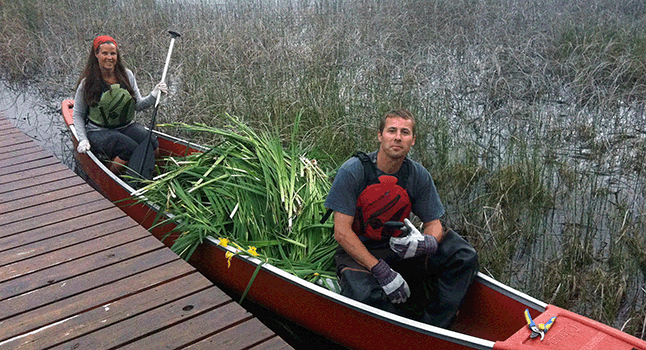
Preventing and stopping the spread of harmful invasive species in BC requires the involvement of all British Columbians, which is why the BC government and groups such as the Columbia Shuswap Invasive Species Society (CSISS) have declared May as Invasive Species Action Month.
The intention is to reinforce the awareness that only by working together and being vigilant, can British Columbians stop invasive species from threatening our environment, economy and society.
“The Columbia Shuswap region is ecologically diverse making our communities an excellent place to explore the outdoors both on land and water, which is why it is essential for people to learn how to identify, report and manage invasive species” says Laura Gaster, program coordinator with CSISS. “Globally, invasive species are the second largest threat to biodiversity loss and provincially cause millions per year in damages. Simple actions such as Clean, Drain, Dry all watercraft, planting non- invasive plants in your garden and not releasing pets in to the wild can help prevent their spread”.
With summer just around the corner, May is an excellent time to take action on invasive species. And CSISS invites everyone to visit www.bcinvasivesmonth.com and to post to social media using the hashtag #bcinvasives. The website includes links to events and activities being held by CSISS, other regional invasive species committees, local governments and stewardship organizations.
In addition, this year’s anti-invasive-species campaign includes a photo contest where people can post photos of invasive species and people taking action to prevent their spread. Photos must be posted to
Instagram or Twitter using the hashtag #bcinvasivescontest to enter to win great prizes. More details are available at www.bcinvasivesmonth.com.
During each of May, CSISS will highlight specific programs that help British Columbians take action against invasives:
- Week 1: Don’t Let It Loose! focused on the harm of releasing unwanted pets and aquarium plants into the wild;
- Week 2: PlantWise, educating gardeners and those in agriculture, ranching and horticulture about preventing and stopping the spread of invasive plants in BC;
- Week 3: Outdoor Recreation, reminding campers and outdoor sports enthusiasts to Buy it Where you Burn It for firewood, and Play Clean Go to remove debris from sports equipment to prevent spreading invasives; and
- Week 4: Clean Drain Dry focused on educating boaters about preventing the spread of aquatic invasive species like mussels and plants.
CSISS will also be hosting a variety of events including the following workshops:
- May 18-19 — Salmon Arm, Plant Identification Workshop with Ken Marr and Okanagan College. FREE;
- May 27 — Revelstoke, Community Based Social Marketing with CBEEN and NCES; and
- May 28 — Revelstoke, Teaching About Invasive Species with CBEEN and NCES.
It is also sponsoring these Weed Pulls and Restoration Events:
- May 12 — Revelstoke. Revelstoke Reach Restoration Project;
- May 25 — Salmon Arm. SABNES Trail Nightshade weed pull;
- May 29 — Gardom Lake. Yellow Flag Iris weed pull; and
- June 2-3 — Little White Lake, Yellow Flag Iris weed pull.
The Columbia Shuswap Invasive Species Society is a non-profit organization dedicated to the prevention, management and reduction of invasive species in the Columbia Shuswap Regional District.
To learn more about invasive species in the Columbia Shuswap region please visit: http://www.columbiashuswapinvasives.org



